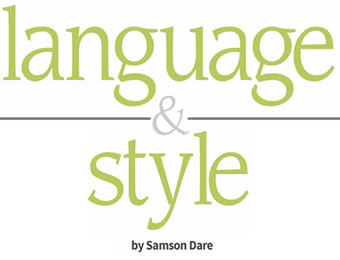The excerpt is replete with all sorts of grammatical and stylistic errors. As an example, let’s pay attention to the verb-form (are) which occurs immediately after the noun vegetation: “forests are becoming empty and vegetation are becoming thinner.” The noun forests is immediately followed by the plural verb-form (are). This plural form of the verb is understandable in that it is consistent with the plural form of the noun forests. Obviously, we have no problem with the reporter’s choice of the plural verb-form in relation to the preceding noun (forests).
But that cannot be said of the reporter’s choice of another plural verb-form (are) relative to the noun vegetation. We are told that “vegetation aregetting thinner.”Undoubtedly, the plural verb-form is inspired by the reporter’s thinking or understanding that the noun vegetation is a plural entity. Nothing can be farther from the truth. That word, vegetation, is an uncountable noun and as such it must attract, not a plural but a singular verb-form.
Now read the following sentences: 1) Thevegetation is green and so are the crops grown in the area. 2) The lush vegetation is supported by rains all year round. 3) The vegetation is inhabited by crawling animals. 4)The vegetation is beautiful from a distance creating an impression of serenity. 5) If the vegetation is destroyed, the soil will be adversely affected.6) Vegetation is to the earth what the hair is to the human head.7) Vegetation is an important feature of any geographical area. 8) Vegetation is closely connected to the culture of the people in a particular area.
Next, we note the word surrounding which occurs in the following context: “he searches all the nooks and crannies of the villages in his surrounding and even goes as far as Niger State.” Please note that this word does not have a final -s.
Here lies the problem. The word surroundings in the sense of environs or environment always has a final –s. Please read the following sentences: 1) It is our duty to keep our surroundings clean and hygienic. 2) The young man is still adjusting to his surroundings. 3) The immediate concern is how to cope with the hostile surroundings. 4) I am unwilling to leave these beautiful surroundings. 5) There is a sense in which your surroundings have an effect on you. 6) The surroundings are conducive to reading and meditation.
This usage is different from the adjectival/participial usage of the word surrounding. In this case, the word does not need a final –s. Read the following sentences: 1) Thesurrounding hills made the city impregnable in the days of incessant warfare.2) The town and the surrounding villages have been poorly treated in spite of the oppressive taxation. 3) The moon and the surrounding stars made the night of celebration a memorable one. 4) The university and the surrounding schools are a source of attraction to foreigners. 5) The surrounding factories provide job opportunities for our sons and daughters. 6) With so many hotels surrounding us, there is no problem of accommodation for our visitors. 7) All the surrounding houses were attacked by armed robbers. 8) We got our independence about the same time many of the surrounding nations got theirs.
Like the noun surroundings, the noun environs always has a final s.Please read the following sentences: 1) From the topmost floor, you could see the school and its environs. 2) It provided an opportunity for us to visit the town and its environs. 3) The imposing tree and its environs were a pleasant sight for tourists. 4) The historic site and its environs soon grew into a tourist cenre. 5) There was no visible civilization in the rocky plateau and its environs. 6) The lake and its environs are infested with crocodiles and other dangerous reptiles.
We now note the following points. The word environs always ends in –s; so does the word surroundings, its synonym. However, when the word surrounding is used as an adjective or participle, it does not need a final –s.
Next, let’s note the singular verb-form (was) which occurs in the following context: “the producers and exporters of charcoal paid about four different levies to the state, the local government and the forest guides, which they claimed was revenue to the government…” As we have noted, that verb (was) is in its singular form. But what is the status of the nominal item to which it relates in concord? The nominal item is: “four different levies.” It should be obvious that the nominal item here is in its plural form. That being the case, the verb has to be changed to its plural form: were. The reporter must have been misled by the long textual distance between the relevant noun item and the verb slot. That shouldn’t be the case with a writer who hopes to win the confidence of readers. Choices have to be made carefully and knowledgeably.







